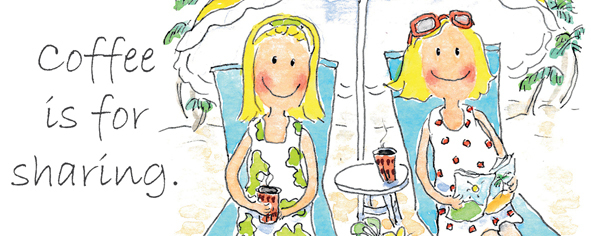Coffee 45 g +1.9 years
Coffee 45 g +1.9 years
Do you remember your first cup of coffee? In my childhood home, the pan was always simmering with Skånerost, and friends and acquaintances came to visit for good conversation over coffee and coffee spontaneously.
Originals with nicknames such as Bosse-lampa, Målar-Rud, Helldovs, and Berra told stories of ancient times. Many have driven past a coffee roaster where the aroma rests heavily over the streets. Scent memory is the emotional memory that lasts the longest and evokes nostalgia.
It’s better to be a shareholder in Starbucks than a customer there. Do they sell the most tonnes of coffee, sugar, or milk? Instead of going to a café, you can go into nature or the park with a thermos. Make your pure organic coffee and invite colleagues and friends to a cup. Instead of regular milk, try almond milk, soy milk, or to make weaker coffee.
Coffee beans are berries that grow on a bush. It is believed that a herder discovered coffee’s refreshing taste in Ethiopia during the 16th century. He noticed that the goats gained energy and did not sleep at night after eating berries from a coffee bush. The shepherd told it to monastery monks, who made a potion from coffee beans, with which they stayed awake all night praying. The news spread to more monks and out into the world.
The astronauts on the International Space Station get coffee sent up into space. At first, they drank coffee out of bags to avoid spillage until the University of Portland invented a new coffee mug that could withstand weightlessness.
In one day, the world consumes 2.25 billion cups of coffee. Finland is the world champion in coffee drinking per capita, and coffee is the most traded commodity after oil.
Positive effects: A study of 450,000 people for 12 years was published in the European Journal of Preventative Cardiology by Professor Kevin Mc-Conway. Coffee drinkers were, in terms of mortality, 2.5 to 3.5 years younger than their actual age compared to non-coffee drinkers. “It’s not quite the same as saying that they will live between two and a half and three and a half years longer, but it’s pretty close to that.” Using the precautionary principle, we credit ourselves with an extra 1.9 years thanks to the coffee.
https://www.sciencemediacentre.org/expert-reaction...
A study with 200,000 participants was followed for up to 30 years. People who consume 3-5 cups of coffee daily have a lower risk of premature death due to various factors, including cardiovascular disease and Parkinson’s disease, compared to non-coffee drinkers. The risk of early death is reduced by an impressive 15% for regular coffee drinkers. Both caffeinated and decaffeinated coffee have advantages. Coffee’s bioactive compounds interfere with disease development and reduce inflammation.
500,000 people were followed for ten years. A connection was found between more significant amounts of coffee and lower death rates from all causes. Compared to non-drinkers, drinkers had 6-7 cups daily, with a 16% lower risk of early death. Instant coffee and decaffeinated coffee showed a similar health benefit.
Loftfield E, Cornelis MC, Caporaso N, Yu K, Sinha R, Freedman N. Association of Coffee Drinking With Mortality by Genetic Variation in Caffeine Metabolism: Findings From the UK Biobank. JAMA Intern Med. 2018 Jul 2.
A 20-year study of 45,335 people with type 2 diabetes found an association between lower risk and the number of cups of coffee drunk. Compared with no coffee, reduced risk ranged from 8% less with 1 cup a day to 33% less for 6 cups a day.
Ding M, Bhupathiraju SN, Chen M, van Dam RM, Hu FB. Caffeinated and decaffeinated coffee consumption and risk of type 2 diabetes: a systematic review and a dose-response meta-analysis. Diabetes Care. 2014 Feb;37(2):569-86.
One study compared the highest intake of coffee (10 cups a day) with the lowest (under 1 cup) and found a 30% lower risk of type 2 diabetes in those who drank the most coffee.
Jiang X, Zhang D, Jiang W. Coffee and caffeine intake and incidence of type 2 diabetes mellitus: a meta-analysis of prospective studies. Eur J Nutr. 2014 Feb;53(1):25-38.
A study with 83,076 women showed that consuming four or more cups of coffee daily provided a 20% reduced risk of stroke.
Lopez-Garcia E, Rodriguez-Artalejo F, Rexrode KM, Logroscino G, Hu FB, van Dam RM. Coffee consumption and risk of stroke in women. Circulation. 2009;119:1116-23.
The research concluded from 37,514 women that coffee drinking of 2-3 cups a day provided a 21% reduced risk of heart disease.
de Koning Gans JM, Uiterwaal CS, van der Schouw YT, et al. Tea and coffee consumption and cardiovascular morbidity and mortality. Arterioscler Thromb Vasc Biol. 2010;30:1665-71.
One study examined associations between moderate coffee drinkers and death from chronic diseases and found 21% less risk of death from cardiovascular disease compared to non-drinkers.
Crippa A, Discacciati A, Larsson SC, Wolk A, Orsini N. Coffee consumption and mortality from all causes, cardiovascular disease, and cancer: a dose-response meta-analysis. Am J Epidemiol. 2014;180:763-75.
Research shows that natural polyphenols in coffee can act as antioxidants and reduce harmful oxidative stress and inflammation in cells. They may have neurological benefits and be antidepressants.
Ding M, Satija A, Bhupathiraju SN, Hu Y, Sun Q, Han J, Lopez-Garcia E, Willett W, van Dam RM, Hu FB. Association of Coffee Consumption With Total and Cause-Specific Mortality in 3 Large Prospective Cohorts. Circulation. 2015 Dec 15;132(24):2305-15.
A study of 263,923 people found that consumption of four or more cups of coffee a day had about a 10% lower risk of depression than those who did not drink any.
Guo X, Park Y, Freedman ND, Sinha R, Hollenbeck AR, Blair A, Chen H. Sweetened beverages, coffee, and tea and depression risk among older US adults. PLoS One. 2014 Apr 17;9(4):e94715.
In research studies with 330,677 participants, a 24% lower risk of depression was seen when comparing the highest (4.5 cups/day) to the lowest (less than 1 cup) intake of coffee.
Wang L, Shen X, Wu Y, Zhang D. Coffee and caffeine consumption and depression: A meta-analysis of observational studies. Aust N Z J Psychiatry. 2016 Mar;50(3):228-42.
A study in the USA found a reduced risk of suicide with increased coffee consumption. Compared to non-coffee drinkers, the risk of suicide was 45% lower in those who drank 2-3 cups and 53% lower in those who drank at least 4 cups per day.
Lucas M, O’Reilly EJ, Pan A, Mirzaei F, Willett WC, Okereke OI, Ascherio A. Coffee, caffeine, and risk of completed suicide: results from three prospective cohorts of American adults. World J Biol Psychiatry. 2014 Jul;15(5):377-86.
Low dopamine levels primarily cause Parkinson’s disease. Studies found a 25% reduced risk of Parkinson’s with a greater intake of caffeinated coffee.
Costa J, Lunet N, Santos C, Santos J, Vaz-Carneiro A. Caffeine exposure and the risk of Parkinson’s disease: a systematic review and meta-analysis of observational studies. J Alzheimers Dis. 2010;20 Suppl 1:S221-38.
Men were followed for ten years to study caffeine and coffee intake in Parkinson’s disease. Those who drank the most caffeine (at least 6 cups of coffee per day) had a 58% lower risk of Parkinson’s compared to non-coffee drinkers.
Ascherio A, Zhang SM, Hernan MA, Kawachi I, Colditz GA, Speizer FE, Willett WC. Prospective study of caffeine consumption and risk of parkinson’s disease in men and women. Ann Neurol. 2001;50:56–63.
In the CAIDE study, drinking 3-5 cups of coffee daily in midlife was associated with a significantly reduced risk of Alzheimer’s disease after 21 years of follow-up.
Eskelinen MH, Kivipelto M. Caffeine as a protective factor in dementia and Alzheimer’s disease. J Alzheimers Dis. 2010;20 Suppl 1:S167-74.
Tip: Pat yourself on the back for all the coffee you’ve drunk throughout your life, and look forward to every cup in the future providing health benefits. Coffee has more than a thousand chemicals, and the taste is affected by the coffee bean, roasting, grinding, and brewing. Coffee tastes good and does good!





